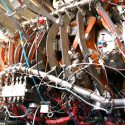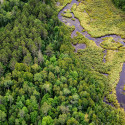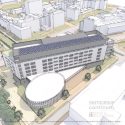Wisconsin designated as Regional Tech Hub for biohealth – with UW–Madison helping lead the way

Wisconsin is among 31 regions selected for the highly competitive Phase 1 Tech Hub designation, chosen from 371 applications across 49 states and four U.S. territories. Along with the Tech Hub designation, Wisconsin was also awarded a Strategy Grant to continue strengthening the state’s biohealth ecosystem. Photo: Jeff Miller
With today’s announcement that Wisconsin has received a Regional Technology and Innovation Hub (Tech Hub) designation focused on biohealth, the University of Wisconsin–Madison expands its national leadership as a collaborative powerhouse in personalized medicine, bioscience and technology.
“UW–Madison is thrilled to be part of the groundbreaking collaboration that helped secure the state’s Regional Tech Hub designation,” says Chancellor Jennifer M. Mnookin. “Our culture of innovation and strong collaborative spirit, both within the university and across the state, make us well-positioned to make the most of this important opportunity.”
The Tech Hub designation opens the doors for millions in federal funding, as well as the opportunity to bring significant new private investment to the state’s biohealth industry. It is expected to generate a substantial number of new jobs, further boosting the state’s biohealth sector and enhancing employment opportunities for local communities.
“The Regional Tech Hub designation confirms what we already know about Wisconsin: When it comes to bringing together the best in research and development, cutting-edge manufacturing, highly skilled and educated workers and a commitment to relentless improvement, no state is better prepared to lead the way,” says Missy Hughes, secretary and CEO of the Wisconsin Economic Development Corporation. “This is a huge win in creating an economy for all, where everyone has the opportunity to live healthy, prosperous lives.”
Wisconsin is among 31 regions selected for the highly competitive Phase 1 Tech Hub designation, chosen from 371 applications across 49 states and four U.S. territories. Along with the Tech Hub designation, Wisconsin was also awarded a Strategy Grant to continue strengthening the state’s biohealth ecosystem.
“This major achievement reflects Wisconsin’s and our university’s great existing strengths in the fast-growing biohealth sector, and, critically, it will help ensure that we continue to push forward innovation, economic growth and transformative advancements in healthcare in service of the Wisconsin Idea,” notes Mnookin.
The university is one of 15 public and private consortium members that helped drive the state’s Tech Hub designation, mobilizing its experience and expertise in bioscience and technology education, industry engagement and research to help bolster Wisconsin’s application.
In addition to funding opportunities and recognition of Wisconsin’s preeminent role in biohealth advancement, the Regional Tech Hub designation supports efforts to generate new technologies and care pathways that will improve care for patients while growing Wisconsin’s economy. This work can better address the unique healthcare needs of marginalized communities, ensuring that everyone, regardless of their background or location, has access to cutting-edge medical solutions and care. Wisconsin’s existing strengths in personalized medicine, biohealth technology, precision manufacturing and automation position the state for additional growth and innovation.
“The reality is, collectively, Wisconsin is already a leader in biohealth technology and precision manufacturing,” said BioForward CEO Lisa Johnson. “We have the capabilities in place and this designation will launch new endeavors that will benefit all of humankind.”
As a member of the consortium, UW–Madison provided vital elements that led to the designation. Its programs in medical physics, biotechnology and medical engineering have created a dynamic workforce in the state. For instance, the Master of Science in Biotechnology program, which works closely with biotechnology industry in the state and beyond, has seen more than 85% of its nearly 500 graduates remain in Wisconsin after graduation. The program integrates science, business, policy and law to educate the next generation of leaders who will develop and commercialize new and promising technologies.
The university has also enjoyed a long history of industry collaboration in the field of biotechnology, partnering with businesses on vaccine advancements, rare disease treatments, imaging technology and more. A 30+ year collaboration with GE HealthCare has built a vital collaborative research and technology relationship, generating substantial health innovations, including more than 100 patents.
At the heart of UW’s contributions is its world-class research engine, ranked eighth in national research rankings for public and private universities.
The Tech Hub recognition stands as a testament to Wisconsin’s leadership in the thriving biohealth industry. In 2022, the industry contributed $32 billion to the state’s economy, employed more than 129,000 individuals and contributed to products and services valued at $6 billion.
With the initial Tech Hub designation secure, UW–Madison will join consortium members in preparing an application for Phase 2, which could unlock access to between $50 and $75 million in federal grants. The state’s strengths across multiple areas make it primed to compete for additional funding.
Learn more about the Regional Tech Hub designation, Wisconsin’s consortium members and the ongoing efforts to expand Wisconsin’s lead in biohealth.
Subscribe to Wisconsin Ideas
Want more stories of the Wisconsin Idea in action? Sign-up for our monthly e-newsletter highlighting how Badgers are taking their education and research beyond the boundaries of the classroom to improve lives.
Tags: biohealth, The Wisconsin Idea



